2023 | Berlinale Talents
Humour in Serious Times
Berlinale Talents is now back as well as an in-person event after two online editions due to the pandemic. In this interview, the heads of the talent promotion initiative, Florian Weghorn and Christine Tröstrum, discuss the growing committed and creative community that feels like a family, the diversity of the various filmmaking crafts and how humour can be an opportunity even in difficult times.
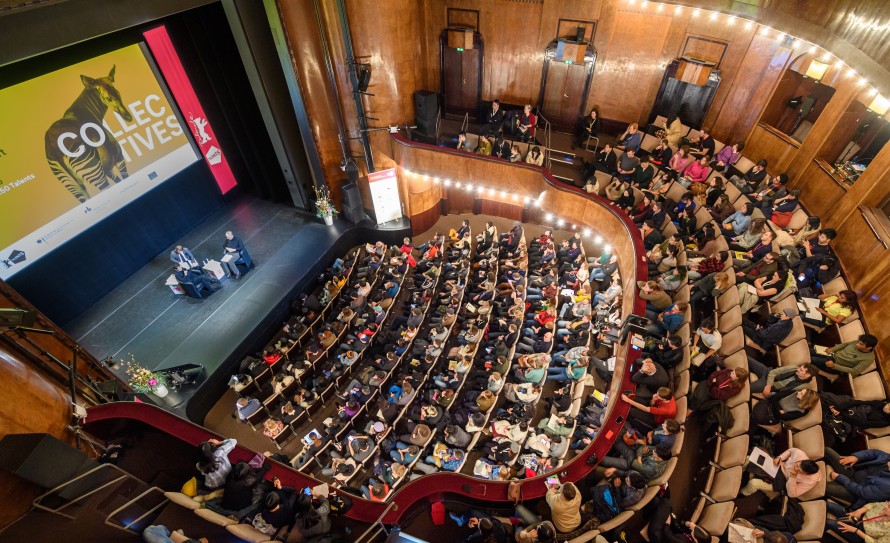
Opening Berlinale Talents 2020
You have invited talents from over 60 countries who will finally be able to participate in person again this year. Who is coming to Berlin?
Florian Weghorn: The 204 Talents have been selected from 3,295 applications and 125 countries. Many have already participated in high-profile projects or even initiated them. For example, more than 40 of this year’s Talents were involved in previous Berlinale films as directors or in other roles.
Christine Tröstrum: They all share a desire to make a difference in their living and working environments – be it artistically or socio-politically. Such as the Ukrainian director Christina Tynkevych, who addresses her country’s social balance of power in her debut feature film How is Katia?; and Anna Melikova, the screenwriter of Isabelle Stever’s film Grand Jeté which screened in the Panorama section in 2022. They are two of a total of six Talents with Ukrainian citizenship this year.
FW: The Talents also include four Iranian directors, some of whom have also been invited to the Talents Labs with their projects. This year in particular, we are once again striving to support the free development of art. This also applies to countries such as Afghanistan and Myanmar, to name just a few.
CT: This year’s group is also characterised by the variety of filmmaking crafts in which they are working. Among the representatives from 14 crafts, there’s the Turkish digital set designer Melis Aksoy who recently worked on Guillermo Del Toro’s Cabinet of Curiosities. And director and multimedia artist Pedro Harres who was born in Porto Alegre in Brazil and is now based in Berlin. His virtual reality project From the Main Square won the top award at last year’s Venice International Film Festival.
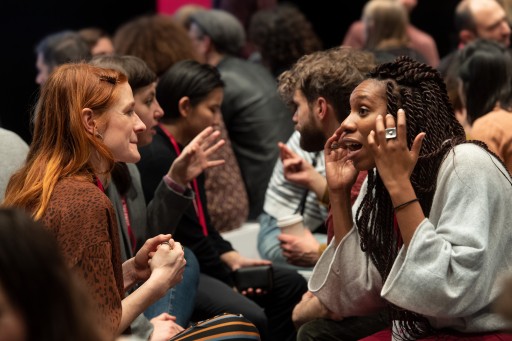
Berlinale Talents 2020
This year’s Berlinale Talents is dedicated to humour, although our current times are often not funny at all. Is there a contradiction here?
FW: Or an opportunity. We must indeed face up to the very real concerns people have and, above all, to the fears that are hidden behind them. War and crisis are never funny, full-stop! Nor is it about trying to laugh away a clear view of reality. But human beings – and the art of film along with them – know how to counter a crisis with other, more positive forces. Laughter may come from the belly but it’s actually a matter of the mind. You have to be able to analyse a situation at lightning speed to recognise the absurdity in it. When this is distilled, a good antidote develops in words and pictures, sometimes with a punch below the belt or just a moment of light relief…
This balance between fun and seriousness is probably not easy to achieve. How did you approach it when designing the programme?
FW: The Berlinale Talents initiative, and therefore also the topics it deals with, has grown from an attitude that is deeply rooted in the genes of the Berlinale: hospitality, cosmopolitanism, a sense of community – and always an unbiased enjoyment of things to come. This provides a firm grounding for us to be free and creative with the programme. When it comes to satirical humour at its cinematic best, many rightly think of Triangle of Sadness. Regarding that film, we’re simply curious: How did you do it, Mr. Östlund? But because Ruben Östlund is going to tell the audience his entire new film in a kind of stand-up act, the talk is also about something else: recognising the audience as people, building relationships, creating an experience – in short, making cinema.
Ruben Östlund is currently taking home many awards. This also applies to other guests this year: Cate Blanchett, Todd Field, Hildur Guðnadóttir, Nina Hoss...
CT: And not to forget the cellist Sophie Kauer who is making her acting debut in TÁR. The qualities of that film and its protagonists are without a doubt and on their own a reason to come to HAU Hebbel am Ufer. But that’s not all. Berlinale Talents is promoting the variety of filmmaking crafts which – jointly – amount to the total work of art that is a film: acting, directing, composition and musical interpretation are all being brought together in this talk... welcome to “our world”!
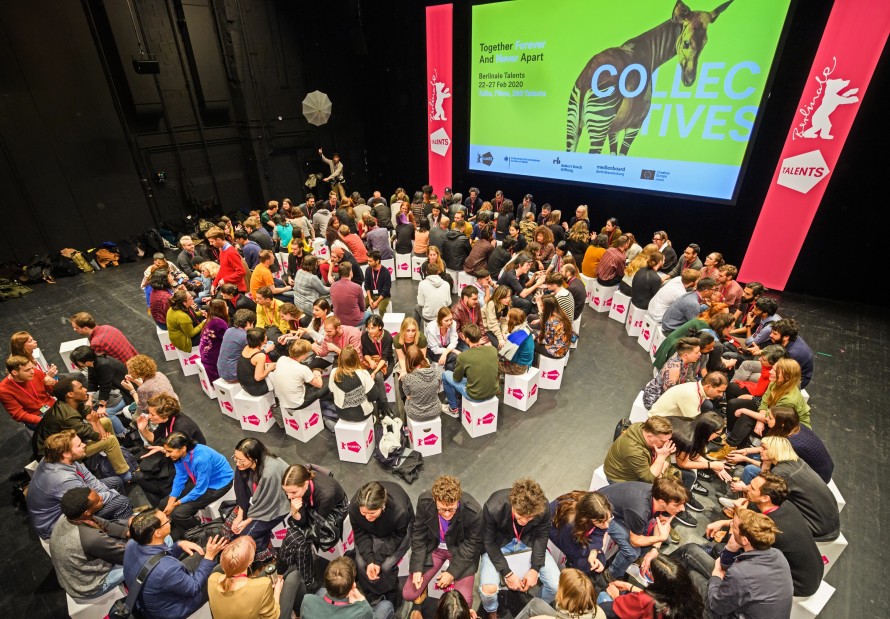
Speed Matching at Berlinale Talents 2020
Which other guests can the audience look forward to in the Berlinale Talents programme?
FW: The director Euzhan Palcy, who recently – and not before time – finally won an Oscar for her lifetime achievement is making her debut appearance in Berlin. Her film Sugar Cane Alley has been selected by Ava DuVernay to be screened in this year’s Berlinale Retrospective and we are also offering her the big stage. Don’t miss the opportunity to join forces with this long-term and still highly active campaigner for equality and diversity.
We’re also really looking forward to Geraldine Chaplin and John Malkovich. Experiencing these two legends in a conversation not only promises to be rather entertaining but also a lesson-with-a-smile in intelligent acting.
You said at the beginning that it was “not about trying to laugh away a clear view of reality”. Let’s return to the seriousness of the present day. Where is this reflected in your programme?
FW: First of all, there are many filmmakers at the festival who are presenting us with their approach to reality. This applies to the crew of Kiss the Future which includes the Iranian-British CNN chief correspondent and war reporter Christiane Amanpour as well as contemporary witnesses and inhabitants of the then occupied city of Sarajevo during the Bosnian War. Nenad Cicin-Sain’s poignant documentary, which is being presented in a Berlinale Special Gala, is about a moment of optimistic resistance that is almost unbelievable today and it offers an interesting alternative to the present.
In addition, this year we’re placing a focus in our programme on two standpoints in particular: the unmediated perspectives of Ukrainian filmmakers in the Russian war of aggression, and representatives of independent Iranian cinema in the fight against oppression. Our contributions to the first collaborative World Cinema Fund Day (by invitation only) and other talks that are open to the public on February 22 are heartfelt: we are giving a voice to those who are really being affected and we are inviting audiences to listen, better understand and ask questions. The Minister of State for Culture and the Media Claudia Roth is also coming to WCF Day and we would like to thank her as our main partner for her long-term and, in every respect, great support of Berlinale Talents and our cause.
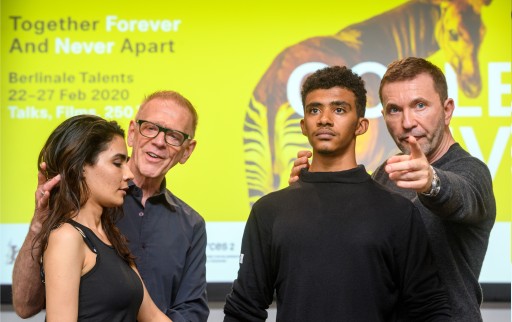
Acting Workshop Berlinale Talents 2020
The general public seems to play a bigger role in your programme every year. Do you organise Berlinale Talents for your invited Talents or for the audiences?
CT: Just like in the festival cinemas, we have members of the public sitting next to filmmakers, having discussions with them and learning from each other.
“Back to the Body – A Laughing Workshop” is perhaps a particularly good example of the bilateral nature of Berlinale Talents. At this event, 200 participants will be put into motion and relationship with each other on stage by acting coaches versed in the Alexander Technique. Humour will be explored physically: Where does it have its origins in the body? How can it relieve tension? After two online editions, we’ve all earned such an event.
Indeed, you too are back with an in-person event. Are there any new formats this year or ones that have already been tried and tested in the two online editions of 2021 and ’22?
CT: Developing our formats further and creating synergies between old and new has been part of our DNA since the beginning of Berlinale Talents. That’s why we can’t be fully certain whether the current developments are influenced by online or in-person events. Already last year we were determined to bring all 200 Talents together for three hours a day in a format that is about self-reflection, strengthening resources and resilience. From the online Dream Journeys and the Talents Tanks, which were also initially tested digitally, a workable large-group format has now emerged in a safe space. This makes it possible to open inner spaces, discover unrecognised talents in yourself, understand others in their differences and exchange visions and dreams as well as very concrete project ideas. Facilitating lived participation and experienced diversity in a group of people from over 68 countries – that is our mission. This year, the Talents Tanks for all 200 Talents are taking place under the title “A Film Community of the Many”.
FW: “Many” is also a good keyword in other ways, because we’re delighted that around 200 alumni from the last two online editions are now coming to the festival in Berlin. It is for them that the Talents Time format has been created: four afternoons specifically for networking between the alumni and current Talents. We are a large community – or even, for many, a family.
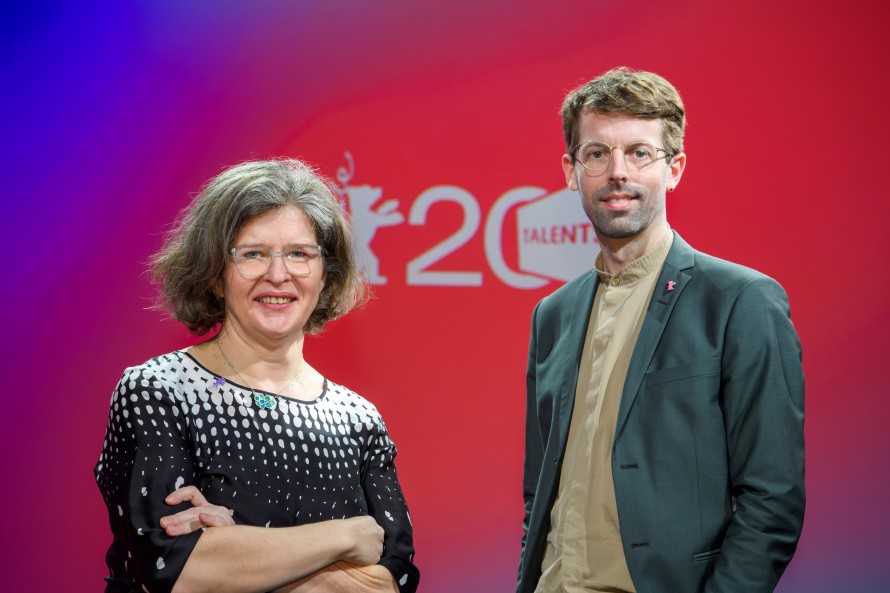
Christine Tröstrum, Project Manager of Berlinale Talents and Florian Weghorn, Programme Manager of Berlinale Talents
Will there still be livestreams after the return to in-person events?
CT: Yes, we’re continuing to offer livestreaming from HAU1, and all public events are being recorded and can be found on our website. Incidentally, it’s also worth taking a look there throughout the year: around 300 recordings of events from the past 20 years are available on the website free of charge.
In order to build a sustainable community, it would appear important that the Talents are supported not only financially but also personally. How do you manage to keep in touch with nearly 10,000 alumni?
FW: The foundation for this community was probably laid 20 years ago with our specially developed database and website. And the Online Reconnects emerged from last year’s Talents Tanks. Every two months, alumni meet there digitally to connect over various topics. The secret lies in the collective approach: everyone can suggest subject matters and host breakout sessions themselves. This is very enriching both for the community and for us and sometimes it can also be very moving – especially when current concerns from war and crisis regions are shared and talked about in the group.
CT: Since the Berlinale Talents initiative is financed from project funds and sponsorship money, a lot of creativity and, at the same time, a clear strategy and attitude are essential to ensure the sustainable development of the community. Based on this start-up mentality, we have developed quite successful future models with and for the alumni as well as with our partners and sponsors. This is how the Talents Footprints came about: they include the Mastercard Enablement Programme, the Kompagnon Fellowship set up with Perspektive Deutsches Kino and the Berlin Film Residencies being offered in collaboration with the Nipkow Programme and the Medienboard. The Enablement Programme and the Kompagnon Fellowship include a small amount of start-up funding after the projects have been selected. We also consider in parallel which next steps in the projects might be particularly difficult to implement and why. Coaches and mentors often help the participants with this over longer periods of time. These Talents Footprints are also successful models in themselves because the participants from the first year are now already supporting the current ones.
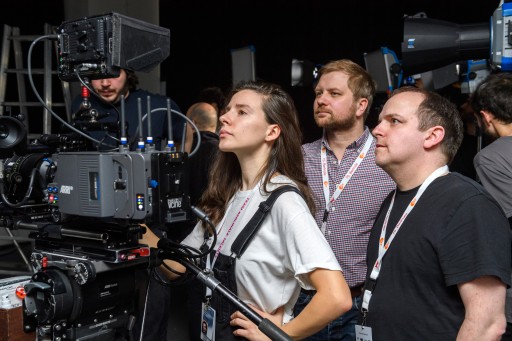
Berlinale Talents 2020
FW: It’s also very important to mention that we do the alumni work together with our global network of Talents International initiatives in Guadalajara, Buenos Aires, Rio de Janeiro, Sarajevo, Durban, Beirut and Tokyo. Ultimately, the strategy is simple: first find the right partners with whom we can jointly implement goals and visions in a type of co-creation. The filmmakers, creatives and organisations in the respective regions of the world always take the lead; we mostly remain cooperation partners and consultants.
CT: Along the lines of this model, we are currently developing a systemic, integrative training programme for future mentors with the support of the Deutsche Welle Academy and together with the Durban Film Institute and a pan-African group of filmmakers. The idea is that after the programme has been tested, other initiatives and non-profit organisations can adopt it and develop it further in their respective regions across the Global South.
What is important to you beyond that? What else does Berlinale Talents stand for?
FW: Above all, we value mental flexibility and an openness to grow next to one another as well as together. This applies to our own programmes but in the future we will also have to continue to build strong networks with others.
CT: In the new MEDIA 360° programme, for example, Creative Europe MEDIA has supported us together with the European Film Market, the Berlinale Co-Production Market and the World Cinema Fund so that, under the umbrella of Berlinale Pro*, we can develop common strategies and even more synergies over the next three years. The focus is on making concrete changes to ensure more social, economic and ecological sustainability, and also on structural innovations such as simple digital access. So once again, it’s all about participation!
Berlinale Talents is a Berlinale Pro* initiative of the Berlin International Film Festival, a division of Kulturveranstaltungen des Bundes in Berlin GmbH, supported by the Minister of State for Culture and Media, Creative Europe - MEDIA Programme of the European Union, Medienboard Berlin Brandenburg, Filmförderungsanstalt, Mastercard, ARRI and Federal Foreign Office.